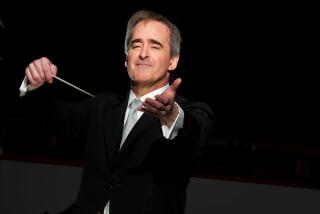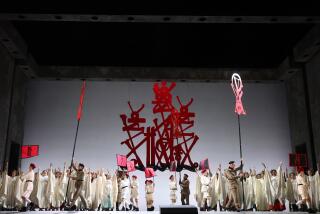COMPOSER’S CONSERVATISM BACK IN STYLE
- Share via
Some composers make a fetish of writing only small amounts of music: “I’m not prolific,” they’ll say--as if producing many works would taint their reputation.
Not Thomas Pasatieri, who, at 41, has written 17 operas--and seen most of them produced--and has created, by his own count, more than 500 songs, plus chamber music, piano pieces and orchestral works.
The American composer will attend the world premiere of his “A Joyful Noise,” to be performed by the Master Chorale of Orange County, Sunday night in Segerstrom Hall at the Orange County Performing Arts Center.
Pasatieri says the new 10-minute setting of three Psalms is written in his “frankly conservative” style.
“It’s funny how things have changed so much since my first works were heard, back in the late 1950s,” he said.
“My style is the same now--it has evolved, but it hasn’t really changed. What is different is that so many others have come around. Harmony has returned--they call it ‘The New Romanticism,’ but it’s basically the conservative style. And everybody’s doing it--my God, George Rochberg is writing in D-flat!”
Pasatieri laughs loudly at the irony of holding his compositional ground while others have gone in different directions, only to return.
“They turned back to Romanticism because it’s successful--and because it’s expressive. Of course, for me, it’s a natural language, and for others it’s not.”
Last year, the native New Yorker who has lived all his life on the East Coast, established a base in Southern California. From his second home, in the San Fernando Valley, he commutes to New York City; until recently he also traveled regularly to Atlanta, where he was director of the Atlanta Opera.
The commission from Master Chorale of Orange County came about, Pasatieri said, “because somebody told Maurice Allard (conductor of the chorale) that I was working here. Maurice called me, and offered me the commission.
“After he sent me a tape of the chorale, I accepted. (The chorale) couldn’t afford a large string section, so I wrote the piece for six brass players, four timpani, and a big organ, plus the full chorale.”
What’s next for this busy composer? “I want to write for films. At this stage, with all my other work behind me, to write for films is a logical extension of the dramatic elements in my music,” Pasatieri said, adding that he has made some inroads in that industry, far from the academic world where he was trained. In 1969, at age 23, Pasatieri took the very first doctoral degree--in any department--from the Juilliard School of Music.
“Of course, I’ll never give up writing operas,” he said with some conviction. It’s easy to guess why: His success rate is impressive.
The composer’s eighth opera, “The Trial of Mary Lincoln” (written on a commission from National Educational Television), was broadcast nationwide at its premiere in February, 1972. The ninth opera, “Black Widow,” was produced at the Seattle Opera a month later. His 10th, with a libretto by poet Kenward Elmslie (the first of four collaborations between them) was “The Seagull,” after the play by Chekhov, by the Houston Opera in 1974.
And “Three Sisters,” the composer’s 17th and latest opera which had its world premiere in Columbus, Ohio, last March, was received successfully by both Ohio audiences and the international press.
More to Read
The biggest entertainment stories
Get our big stories about Hollywood, film, television, music, arts, culture and more right in your inbox as soon as they publish.
You may occasionally receive promotional content from the Los Angeles Times.










